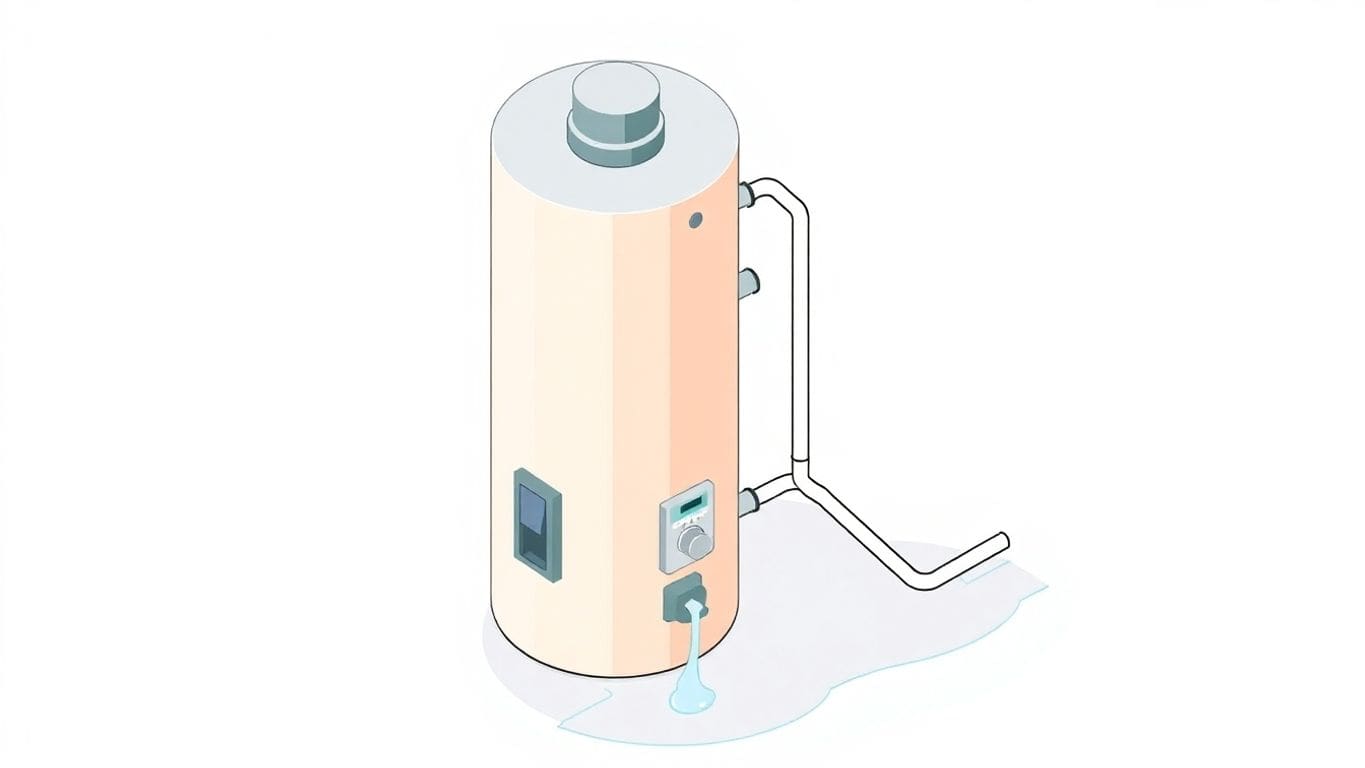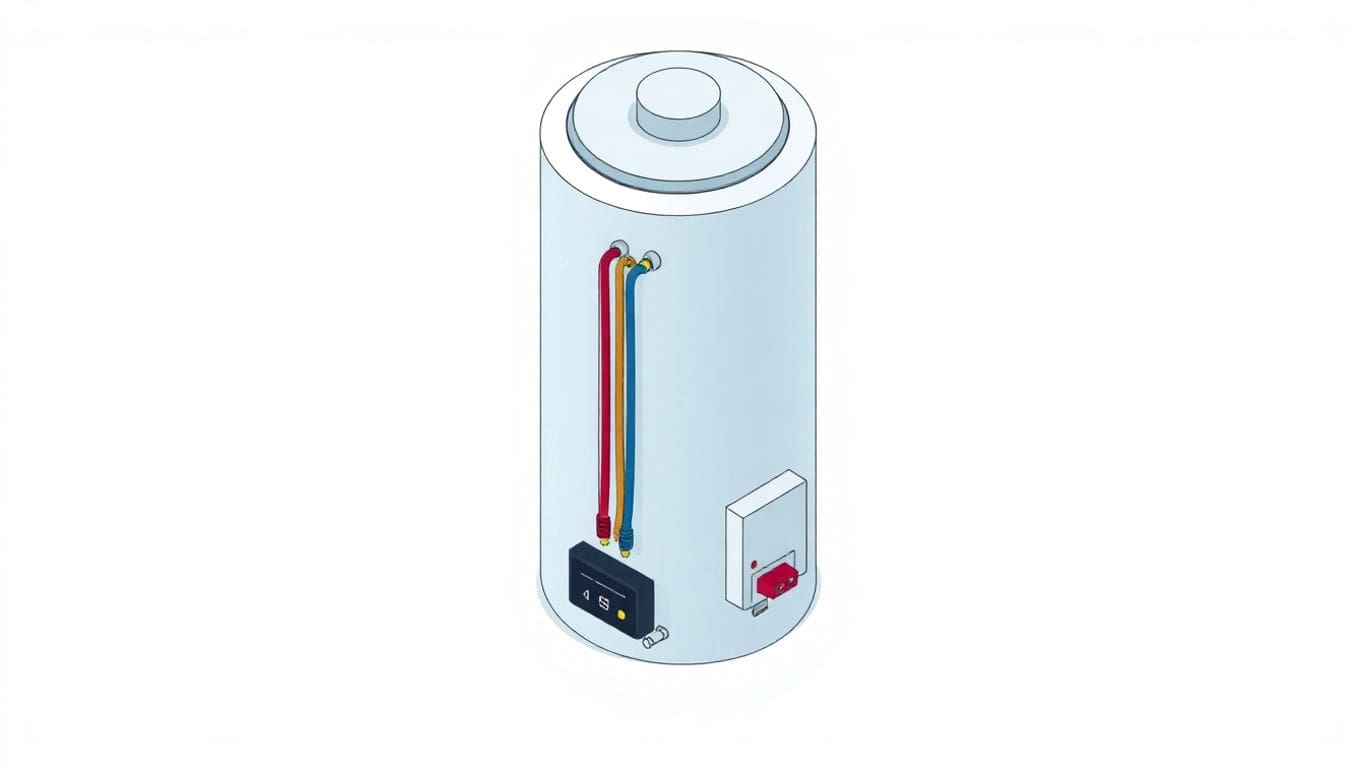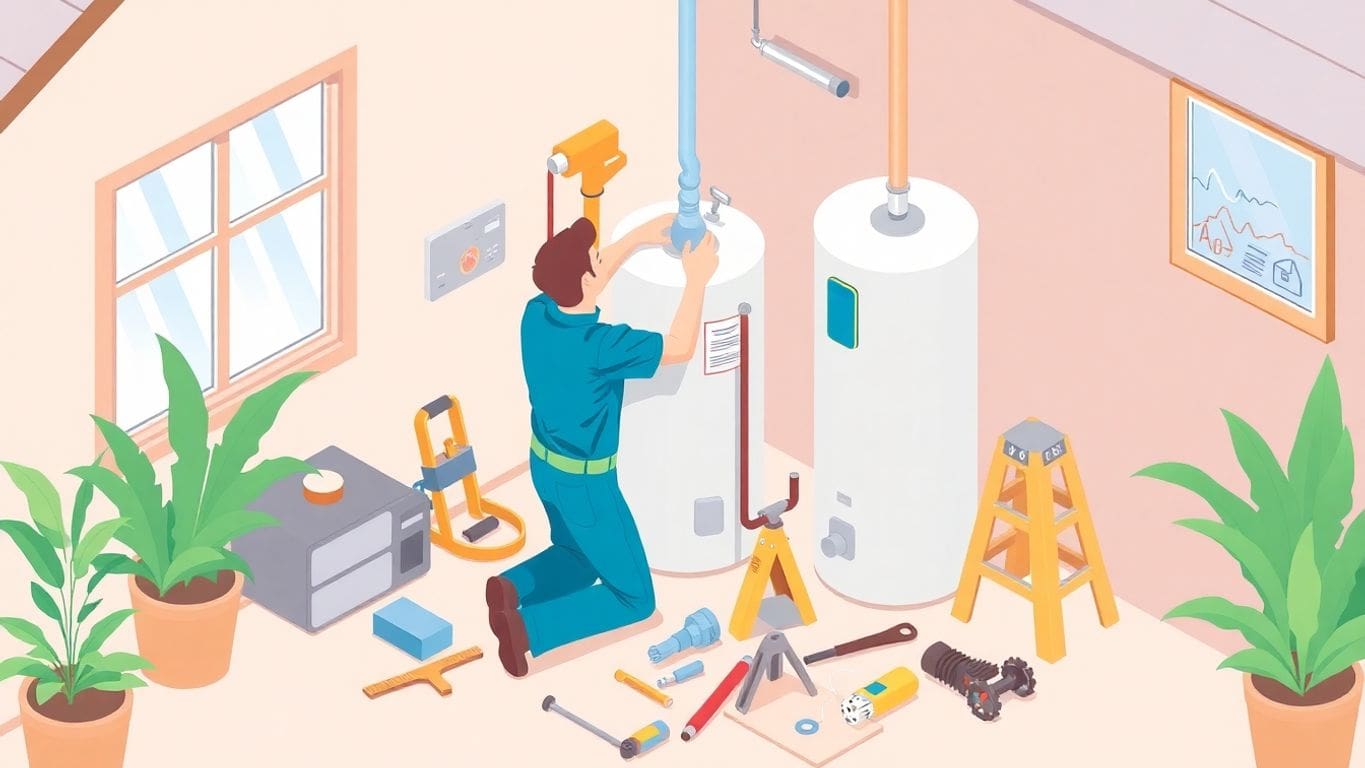
Are you in the market for a new water heater? If so, one of the biggest questions you’ll face is how many water heaters does a house need to keep everyone comfortable. The right number can depend on various factors like your household size, the number of bathrooms, and your daily hot water habits. This guide walks you through the key considerations to help you make the best choice for your home.
Before you even think about buying a new water heater, you need to figure out how much hot water you actually use. It’s like trying to pick out the right size shoes without knowing your foot size. Understanding your hot water needs is the first step in picking the right water heater.
Start by thinking about everything in your house that uses hot water. Showers, sinks, dishwashers, washing machines – write them all down. Then, try to guess how much water each thing uses every day. For example, a quick shower might use 10 gallons, while a long bath could use 40. Estimating is key here. It doesn’t have to be perfect, but it should be close.
Think about when you use the most hot water. Is it in the morning when everyone is getting ready for work or school? Or maybe in the evening when you’re doing laundry and washing dishes? These are your peak times. Knowing when you use the most water helps you pick a water heater that can keep up. If everyone showers at the same time, you need a heater that can handle that rush.
Do you use more hot water in the winter than in the summer? Maybe you take longer, hotter showers when it’s cold outside. Or perhaps you do more laundry in the summer because of sweaty clothes. These seasonal changes can affect how much hot water you need. If you notice big differences, you might need a bigger water heater or a different type of system.
Tracking your hot water usage for a week or two can give you a better idea of your needs. Write down when you use hot water and for what. This will help you see patterns and make a better choice when it comes to picking a water heater.
The number of bathrooms in your home is a big deal when figuring out what size water heater you need. More bathrooms usually mean more people using hot water at the same time. Let’s break it down.
If you’ve got more than one bathroom, think about how often they’re used at the same time. Like, does everyone shower at 7 AM before work and school? That’s a peak demand situation. More bathrooms mean you’ll likely need a bigger water heater to handle those times when everyone’s using hot water at once.
Not all bathrooms are created equal. A small half-bath with just a sink won’t use as much hot water as a master bath with a huge soaking tub and a fancy shower. Here’s a general idea:
Okay, so how does this translate to water heater size? Here’s a simple guide:
Remember, these are just estimates. Your actual hot water use depends on your family’s habits. If you have teenagers who take long showers, you’ll need to upsize!
When you’re figuring out what size water heater you need, think about how many people live in your house. A bigger family needs a bigger water heater. A smaller family can get by with a smaller one. It’s pretty simple.
How many people are in your house? This is the first question to ask. A single person won’t use as much hot water as a family of five. Knowing the number of people helps you estimate the total hot water you’ll need each day. Here’s a general idea:
Think about what everyone in your family does that uses hot water. Do you have kids who take long showers? Does someone like to fill up a huge bathtub every night? All these things add up. If you have a family that uses a lot of hot water, you’ll need a bigger heater. If everyone is pretty quick with their showers, you can probably go with something smaller.
Do you often have guests staying over? Or maybe family visits for holidays? If so, you’ll need to think about those times too. A water heater that’s just right for your family might not be big enough when you have extra people using hot water. Consider getting a slightly larger water heater than you think you need, just to be safe. It’s better to have too much hot water than not enough.
Think about your peak hot water times. This is when everyone is using hot water at the same time, like in the morning when everyone is getting ready for work or school. Make sure your water heater can handle those peak times. If not, someone might end up with a cold shower!
It’s important to think about all the things in your house that use hot water. This helps you figure out how much hot water you really need. Let’s look at all your plumbing fixtures and appliances.
First, walk around your house and count every place where you use hot water. This includes:
Each outlet adds to the total amount of hot water you need. The more outlets, the bigger your water heater might need to be. Make a list so you don’t forget anything!
Dishwashers and washing machines use a lot of hot water. Dishwashers usually heat their own water a bit, but they still need a good amount of hot water from your water heater. Washing machines can use a lot of hot water, especially for hot water cycles.
Think about how often you use these appliances. Do you run the dishwasher every day, or just a few times a week? How many loads of laundry do you do? This will help you estimate how much hot water these appliances use.
Different fixtures use different amounts of hot water. Here’s a general idea:
Knowing these numbers helps you estimate your peak demand. If you often run the shower and dishwasher at the same time, you need a water heater that can handle that much demand. Consider the hot water needs of your family to ensure everyone has enough hot water.
It’s important to really look at how you use hot water. This helps you pick the right size water heater. Let’s figure out your hot water habits.
Keep track of when and how you use hot water each day. Think about everything, like showers, washing dishes, and doing laundry. Write down when you do these things and how long they take. This will give you a good idea of your typical hot water use.
Here’s a simple way to track your usage:
Figure out when you use the most hot water. Is it in the morning when everyone is getting ready? Or in the evening when you’re doing dishes and laundry? Knowing your peak hour demand is key. This is when you need the most hot water at once.
Understanding when you use the most hot water helps you choose a water heater that can keep up. If you often run out of hot water, it might be because your water heater can’t handle your peak demand.
Think about any changes in your life that might affect your hot water use. Are you planning to have more kids? Will you be doing more laundry or dishes? Maybe you’re thinking about getting a bigger bathtub. All of these things can change how much hot water you need. If you are planning on doing some water heater maintenance, it’s a good time to think about these things.
Before you get too excited about a new water heater, let’s talk about where it’s actually going to live. You need to think about the space you have available. It’s not just about fitting the unit in; it’s also about making sure it’s safe and easy to work on later.
First, grab a measuring tape! You need to know the height, width, and depth of the area where you plan to put the water heater. Make sure you have enough room to easily access the unit for maintenance and repairs. Don’t forget to account for any pipes or other obstructions that might get in the way. A cramped space can make future repairs a real headache. You might need to consider a smaller unit if space is tight.
If you’re going with a gas water heater, ventilation is super important. These heaters produce exhaust gases, like carbon monoxide, that need to be safely vented outside. You’ll need to make sure you have a proper vent installation that meets local codes. Check for these:
Improper ventilation can be dangerous, so don’t skip this step. It’s always best to consult with a professional to make sure everything is up to code.
Next, take a look at your existing plumbing. Will the new water heater easily connect to your current pipes? Are the pipe sizes the same? If not, you might need to make some adjustments. Also, think about the location of the water supply lines and the drain. You want to make sure everything lines up without too much hassle. Here are some things to consider:
If you’re not comfortable working with plumbing, it’s best to call a plumber. They can help you figure out what needs to be done to make sure your new water heater is properly connected. Remember, a little planning now can save you a lot of trouble later. Thinking about your hot water needs is important too!
Choosing between a tank and tankless water heater can feel like a big decision. Both have good points, but one might fit your home and lifestyle better. Let’s look at the differences to help you pick the right one.
Tank water heaters are the more common type. They heat water and store it in a tank, ready for when you need it. Here are some benefits:
Tank water heaters are a reliable choice if you want a simple and affordable way to have hot water. They’ve been around for a long time, and most people are familiar with how they work.
Tankless water heaters, also called on-demand heaters, heat water only when you need it. This means you don’t have a tank of water sitting around, losing heat. Here’s why they’re great:
No matter which type you choose, getting the right size is key. For tank heaters, think about how much hot water your household uses at peak times. A gallon water heater may suffice for smaller households. For tankless heaters, you need to know the flow rate (how many gallons per minute) you’ll need when multiple appliances are running.
Here’s a simple guide:
| Feature | Tank Water Heater | Tankless Water Heater |
|---|---|---|
| Upfront Cost | Lower | Higher |
| Hot Water Supply | Limited by tank size | Unlimited |
| Energy Efficiency | Can lose heat while stored | Heats water on demand, potentially more efficient |
| Space | Requires more space for the tank | Compact, can be wall-mounted |
It’s important to know how fast your water heater can heat water and how much it can hold. This helps you make sure you have enough hot water when you need it.
The recovery rate is how quickly your water heater can heat up water. It’s usually measured in gallons per hour (GPH). A higher recovery rate means your water heater can heat more water faster. This is good if you use a lot of hot water at once. For example, if you have a big family and everyone showers in the morning, you’ll want a water heater with a good recovery rate.
Capacity is how much hot water your tank can hold. If you have a small tank, you might run out of hot water quickly. A bigger tank means more hot water is ready when you need it. But, a bigger tank can also take longer to heat up. The right capacity depends on how many people live in your house and how much hot water you use.
To figure out what you need, think about how much hot water you use at once. This is called peak demand.
Here’s how you can estimate:
Add up how much hot water you use during the busiest time of day. This will help you choose a water heater with the right recovery rate and capacity. If you are seeing signs of water heater failure, it might be time to consider an upgrade.
Think about your daily routine. Do you all shower at the same time? Do you run the dishwasher and washing machine at the same time? These things affect how much hot water you need. Knowing your habits helps you pick the right water heater.
You’ve been doing your research, but sometimes, it’s best to get help from someone who knows water heaters really well. Figuring out the right size and type can be tricky, so don’t be afraid to ask for help!
Sometimes, you just need a pro. If you have complicated plumbing or a big family, getting expert advice is a smart move. Think about it: lots of people using water at the same time can really change what you need. Also, if you’re thinking about new types of water heaters, like solar or heat pump models, a plumber can help you figure things out. They also know all the local rules, so you don’t have to worry about that!
Here’s when you might want to call a plumber:
When you talk to a plumber, have some questions ready. This helps you get the best information for your situation. Ask about different brands, energy efficiency, and how long the water heater is expected to last. Also, ask about warranties and what to do if something goes wrong.
Here are some good questions to ask:
Before you agree to anything, make sure you know how much it will cost. Get a written estimate that includes everything: the water heater itself, labor, and any extra parts. Don’t be afraid to ask for a breakdown of the costs so you know exactly what you’re paying for. Also, see if there are any rebates or tax credits available to help lower the cost.
Getting a new water heater can be a big expense, but it’s important to do it right. Make sure you understand all the costs involved and that you’re getting a fair price. Don’t be afraid to shop around and get multiple estimates before making a decision.
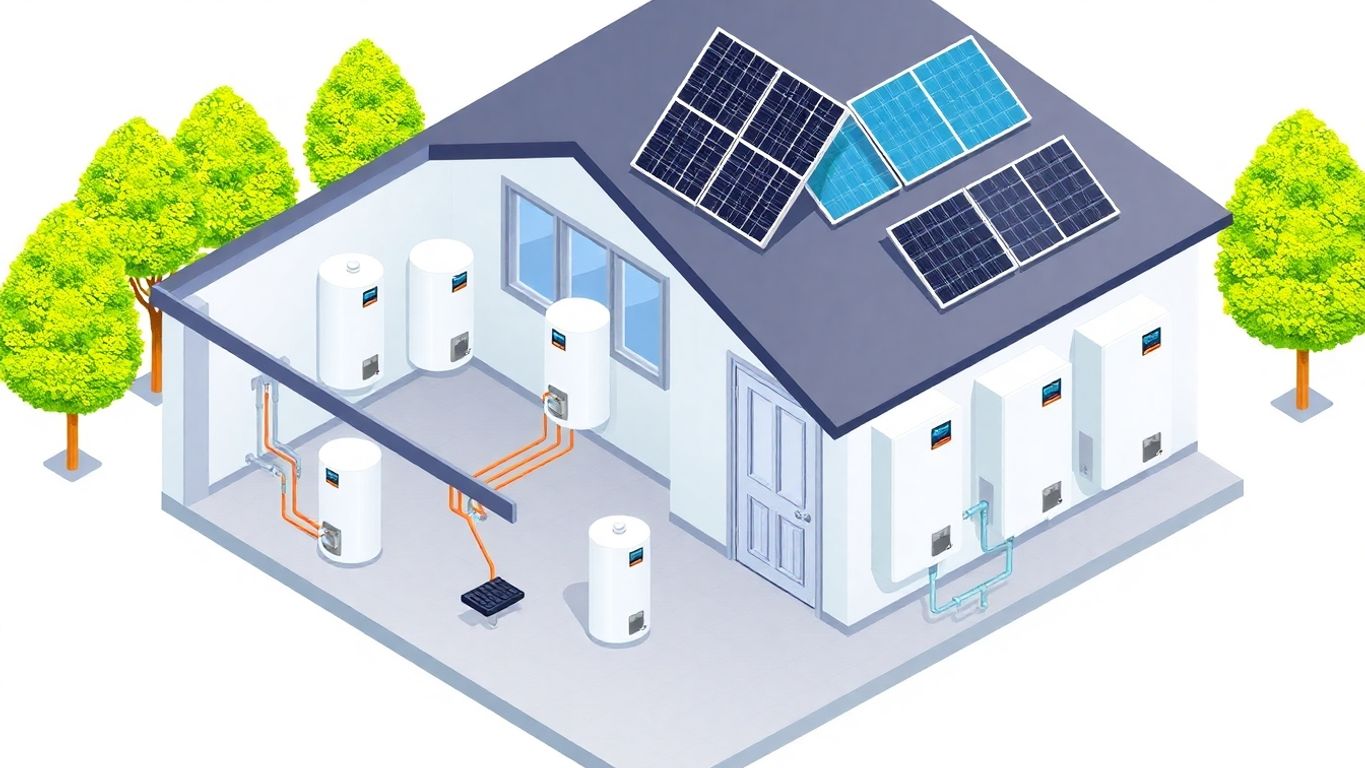
It’s smart to think about how much energy your water heater uses. This can save you money and help the environment. Let’s look at some ways to make sure your water heater is running efficiently.
When you’re buying a new water heater, look for models that are energy-efficient. These models have features that help them use less energy. Check the Energy Factor (EF) rating; a higher EF means more efficiency.
Water heaters can use different energy sources, like electricity, natural gas, propane, or even solar power. Each source has its own costs and benefits. Think about which energy source is most affordable and environmentally friendly in your area.
Choosing an energy-efficient water heater can save you money over time. Even though these models might cost more upfront, they can lower your monthly utility bills.
Over the years, the savings can really add up. Plus, you’ll be helping to reduce your carbon footprint, which is good for the planet. It’s a win-win situation!
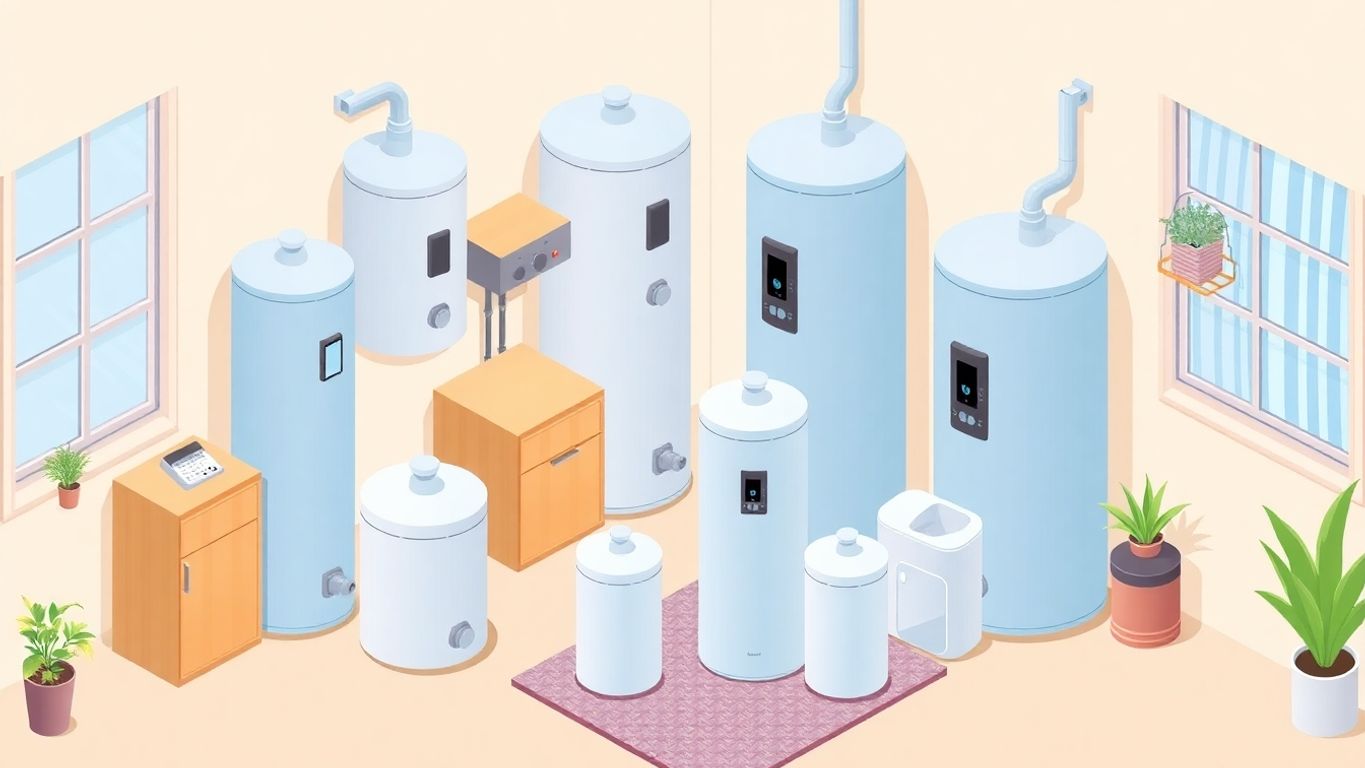
It’s smart to think about the future when you pick a water heater. What works now might not work in a few years. Here’s how to plan ahead.
Will your family get bigger? More people means more hot water use. Think about getting a bigger water heater than you need right now. This way, you won’t have to replace it soon if your family grows. A bigger tank or a tankless heater could be good choices.
Are you planning to remodel your bathroom or kitchen? New appliances, like a bigger tub or a fancy shower, might need more hot water. Plan for this extra demand when you choose your water heater. It’s easier to do it now than to change it later.
Think about how your hot water needs might change over time. Will you have older parents living with you? Do you plan to rent out a room? These things can change how much hot water you use.
Choosing a water heater isn’t just about today. It’s about making sure you have enough hot water for whatever comes next. Consider your future plans and pick a water heater that can handle them. This will save you money and trouble in the long run.
To determine the right size, think about how much hot water your family uses daily. Count the number of people in your home and how many bathrooms you have. A general rule is to have about 20 gallons of hot water for each person.
If your home has multiple bathrooms, you will likely need a larger water heater. For one bathroom, a 30-40 gallon heater is often enough, while homes with two or more bathrooms usually need at least a 50-gallon heater.
You can keep a log for a week to see when you use the most hot water. Note activities like showers, laundry, and dishwashing to understand your peak usage times.
Tank water heaters store hot water in a tank, while tankless heaters heat water on demand. Tankless models can save space and energy but may require more upfront investment.
The more people in your home, the more hot water you will need. Larger families will need bigger heaters to ensure everyone has enough hot water for showers and other activities.
Make sure you have enough room to install the heater. Check the dimensions and ensure there is good ventilation and that your plumbing can handle the new unit.
Yes! Look for models that are labeled as energy-efficient. These can help you save money on your utility bills in the long run.
If you’re unsure about sizing your water heater or if you have specific needs, it’s a good idea to consult a plumber. They can help you choose the best option for your home.

